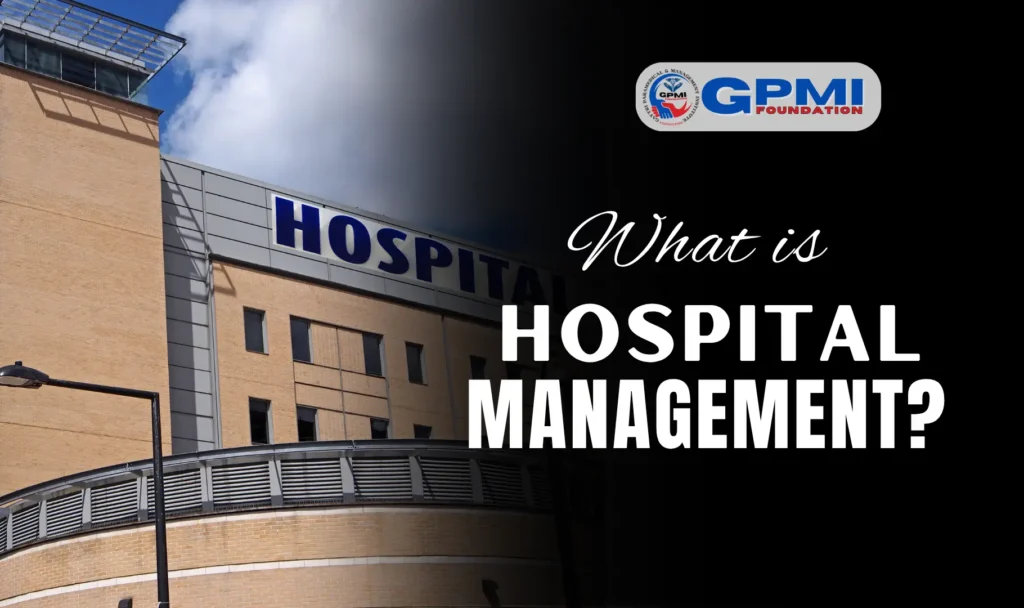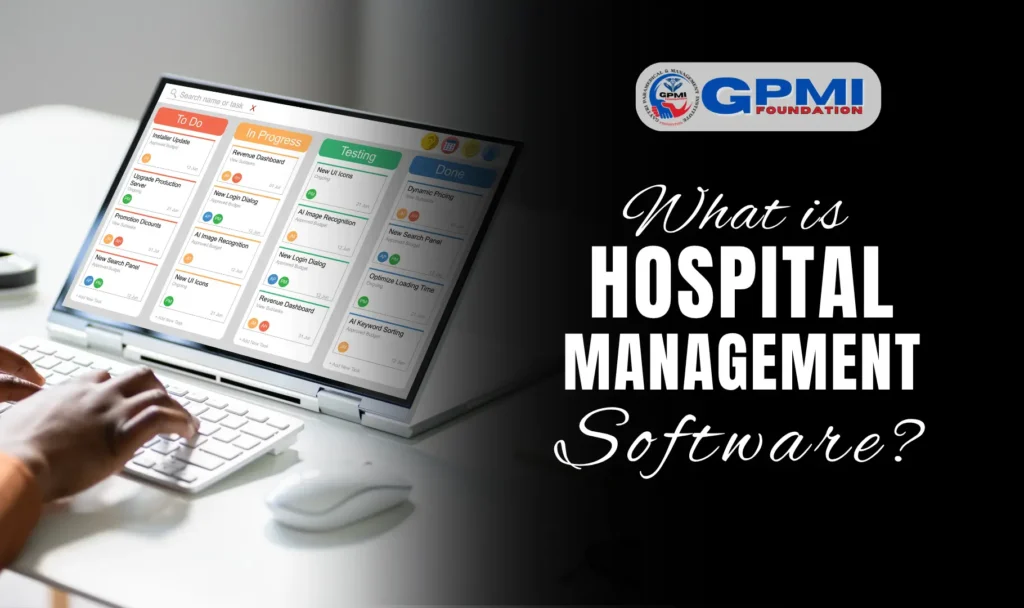If you are someone who wants to lead and manage hospitals, clinics, or healthcare services, then an MBA in Hospital Management can be the right choice for you. Hospital Management teaches students how to handle the business side of healthcare, including planning, budgeting, staff management, and improving patient care.
This course is perfect for those who want to mix medical knowledge with management skills. With the rise in private hospitals and healthcare services, trained hospital managers are in high demand.
The course usually takes two years and is open to graduates from any stream, though some colleges may prefer students from science or health backgrounds.
After completing the course, students can get jobs as hospital administrators, healthcare managers, or medical officers in both private and government sectors. Salaries are attractive, and there is good growth in this field. Let’s dive into the course and look at how to get admission, job options, and expected salary after this course.
Table of Contents
What is Hospital Management?

Hospital Management is all about running and managing hospitals, clinics, and other healthcare centers smoothly. It focuses on making sure that patients get the best care while the hospital works efficiently.
People in hospital management look after hospital staff, plan budgets, handle records, maintain equipment, and solve daily problems. It is a mix of healthcare knowledge and business skills.
With the growing number of hospitals and healthcare services, the need for skilled managers is also rising fast. Students who are interested in healthcare but don’t want to become doctors or nurses can choose this career path.
There are many hospital management courses after 12th that help students start early in this field such as diploma in hospital management (DHM), BBA in hospital management (BHM). These courses teach the basics of healthcare systems, medical terms, hospital operations, and patient care management.
After completing these courses, students can work in hospitals, clinics, diagnostic centers, or even health insurance companies. It’s a smart and rewarding career option.
Difference Between Hospital Administration and Hospital Management
Hospital Administration and Hospital Management are closely related but not the same. Both are important for the smooth working of hospitals, but they focus on different areas.
👉 Hospital Administration is more about the day-to-day operations of a hospital. It includes managing the staff, patient records, cleanliness, schedules, and making sure all departments work well together. An administrator ensures the hospital runs smoothly and follows all rules and policies.
👉 Hospital Management, on the other hand, focuses on planning, strategy, and decision-making. A hospital manager looks at the bigger picture. They work on budgeting, marketing, setting goals, improving services, and making long-term plans for the hospital’s growth.
In short, administration handles the daily tasks, while management deals with planning and development. Both roles often work together to keep the hospital running efficiently and to provide the best care to patients.
What is Hospital Management Course?
A Hospital Management course teaches students how to run a hospital or healthcare center in a smooth and organized way. It is not about treating patients like doctors, but about managing hospital work like patient records, staff duties, bills, medical supplies, and daily operations.
The course also covers topics like health laws, finance, safety, and hospital planning. This course is perfect for students who want to work in the healthcare field but don’t want to study medicine or nursing.
You can join hospital management courses after 12th or after graduation. These courses can be diploma, bachelor’s, or even MBA level. After completing the course, students can get jobs in hospitals, clinics, insurance companies, and health departments. Roles like hospital administrator, patient care manager, or medical office manager are common.
What is MBA in Hospital Management?

MBA in Hospital Management is a two-year postgraduate course that teaches students how to manage hospitals, clinics, and other healthcare services. It is the right choice for those who want to work in healthcare but not as doctors or nurses.
The course combines business skills with healthcare knowledge. Students learn about hospital operations, health laws, finance, marketing, and staff management. With the growing number of hospitals and health centers, there is a high demand for skilled managers in this field.
After completing an MBA Hospital Management course, students can work as hospital administrators, healthcare managers, or department heads in both private and government hospitals. Some even get jobs in health insurance companies, medical tourism, or NGOs.
The course helps students become leaders who can improve healthcare systems and make hospitals more efficient. If you enjoy solving problems, managing people, and helping others, this course can be a smart and rewarding career choice.
MBA HM Course Duration & Eligibility
The MBA in Hospital Management (MBA HM) is a 2-year postgraduate course that focuses on managing healthcare services like hospitals, clinics, and medical offices. The course is divided into four semesters, covering subjects such as hospital operations, healthcare laws, finance, marketing, and human resources in healthcare.
To apply for this course, a candidate must have:
- Completed a bachelor’s degree in any stream (like BBA, B.Sc., B.Com, or BA)
- Minimum 50% marks in graduation (some institutes may accept 45%)
- Some colleges may require scores from entrance exams like CAT, MAT, XAT, or university-level tests.
Students from medical, paramedical, or non-medical backgrounds can all apply for this course. Fresh graduates or even working professionals looking to enter the healthcare management field can benefit greatly from it.
MBA Hospital Management Course Fees
The fees for an MBA in Hospital Management depend on the college or university. It can vary based on whether the college is private or government.
- Fee Range: ₹2 lakh to ₹8 lakh (for 2 years)
- Government Colleges: ₹1.5 lakh to ₹3 lakh
- Private Colleges: ₹4 lakh to ₹8 lakh or more
- What’s Included: Tuition, library, lab, and sometimes hostel fees
- Payment Options: Many colleges allow installments or EMIs
- Scholarships: Available based on marks or financial background
- Education Loans: Most banks offer loans for this course
- Extra Charges: Some colleges may add costs for books, exams, or training
Before applying, always check the full fee details on the official website of the college.
MBA in Hospital Management Salary
After completing an MBA in Hospital Management, graduates can earn a good salary depending on their job role, experience, and the type of hospital or healthcare organization they join.
- Freshers can earn around ₹3 to ₹5 lakh per year
- With 2–5 years of experience, salary can go up to ₹6 to ₹10 lakh per year
- Top private hospitals and multinational healthcare companies may offer even higher packages
- Those with an MBA from top institutes like IIMs or ISB often start with better pay
- Roles like Hospital Administrator, Healthcare Manager, or Operations Head pay more
- Experience and skills in areas like hospital quality, insurance, or health IT increase salary
Overall, an MBA in Hospital Management offers strong career growth and stable income in the ever-growing healthcare industry.
MBA in Hospital Management Distance Education
MBA in Hospital Management through distance education is a flexible option for students and working professionals who want to study while continuing their jobs or other responsibilities.
This course teaches hospital operations, healthcare laws, medical billing, HR, and finance — all through online or postal study material, without attending regular classes.
- Duration: 2 years (can be extended up to 4 years in some cases)
- Mode: Online classes, recorded lectures, or printed books
- Top Institutes: IGNOU, Symbiosis, Annamalai University, and others
- Eligibility: Graduation in any stream with minimum 50% marks
- Fees: ₹30,000 to ₹1,00,000 for the full course
- Best For: Working professionals or students in remote areas
This mode offers flexibility, but students should choose a UGC-DEB approved university to ensure their degree is valid for jobs or further studies.
How to Do MBA in Hospital Management?

Doing an MBA in Hospital Management is a smart move if you want to grow your career in the healthcare field. This course helps you learn how to manage hospitals, clinics, or any healthcare center efficiently.
Here’s an easy step-by-step guide to help you understand how to do an MBA in Hospital Management.
👉 Step 1: Complete Your Graduation
- You must have a bachelor’s degree from a recognized university.
- You can graduate in any stream – Science, Commerce, Arts, or Management.
- Most colleges require a minimum of 50% marks in graduation.
- Some colleges give relaxation to reserved category students.
👉 Step 2: Choose the Right Mode of Study
You can pursue this MBA in three ways:
- Regular (Full-Time) – 2 years in college/university.
- Distance Learning – Study from home with online or printed materials.
- Online MBA – Fully digital learning with live or recorded classes.
Choose the mode that fits your time, budget, and career plan.
👉 Step 3: Appear for Entrance Exam (if required)
Some universities require an entrance test. Popular exams include:
- CAT (Common Admission Test)
- MAT (Management Aptitude Test)
- XAT, CMAT, ATMA, or other university-level exams
Many private universities offer direct admission based on merit (your graduation marks), especially for distance or online modes.
👉 Step 4: Apply to Good Colleges
Search and shortlist top colleges or universities offering MBA in Hospital Management. Some reputed names are:
- Tata Institute of Social Sciences (TISS)
- Symbiosis Institute of Health Sciences
- IIHMR University
- IGNOU (for distance MBA)
Check the eligibility, fee structure, placement records, and approvals like UGC, AICTE, or NAAC grade.
👉 Step 5: Complete the Course
- Duration: 2 years, divided into 4 semesters.
- Subjects include hospital operations, healthcare laws, finance, HR, patient care, and more.
- You may also need to do internships or projects in hospitals.
👉 Step 6: Apply for Jobs
After completing your MBA, apply for roles like:
- Hospital Administrator
- Operations Manager
- Quality Control Officer
- Medical Superintendent Assistant
- Healthcare Consultant
👉 Final Tips:
- Keep your communication and leadership skills strong.
- Gain real-world experience through internships.
- Choose a college with placement support.
By following these steps, you can successfully build a career in the fast-growing healthcare management industry.
What is Hospital Management Software?

Hospital Management Software (HMS) is a computer-based system that helps hospitals and clinics run smoothly. It is designed to manage all the daily tasks of a hospital such as patient registration, appointment booking, billing, medical records, inventory, staff management, and report generation.
With this software, hospital staff can save time, reduce paperwork, and avoid mistakes. It also helps doctors quickly access patient history and test results.
Key Features:
- Patient registration and records
- Appointment and doctor scheduling
- Billing and payment tracking
- Pharmacy and lab management
- Staff duty and payroll
- Report generation and analytics
HMS is used by small clinics, nursing homes, and large hospitals to make their work faster, safer, and more organized. It improves patient care and reduces manual errors. Today, many hospitals use cloud-based HMS, which can be accessed from any device with internet.
What is Hospital Management System Project?
A Hospital Management System Project is a software-based project designed to help hospitals or clinics manage their daily operations in an organized and digital way.
This project is often created by IT or computer science students as part of their academic work. It includes features that allow hospitals to handle patient registration, appointments, billing, staff records, medicine inventory, and medical reports.
Common Features:
- Patient details and history
- Doctor and staff management
- Appointment scheduling
- Billing and payment system
- Lab test and report tracking
- Pharmacy stock management
It can be created using programming languages like Java, Python, PHP, or frameworks like Laravel or .NET. A well-designed hospital management system project is useful not only for academic learning but also for real-life application in healthcare centers.
What is ER Diagram for Hospital Management System?
An ER Diagram (Entity-Relationship Diagram) for a Hospital Management System is a visual chart that shows how different parts of the system are connected. It helps developers and students understand how data flows between patients, doctors, staff, appointments, billing, and more.
In the hospital management system ER diagram, the main entities are:
- Patient
- Doctor
- Appointment
- Staff
- Billing
- Laboratory
- Room or Ward
Each entity has attributes (like name, ID, age, etc.) and is connected using relationships. For example, a patient books an appointment, and a doctor checks the patient. These relationships are clearly shown in the ER diagram of hospital management system to make software development easier.
This diagram is often the first step in designing a hospital software project and helps in building the database in a proper structure.
What is Use Case Diagram for Hospital Management System?
A Use Case Diagram for Hospital Management System is a visual tool used in software design to show how users (called actors) interact with the system. It explains the different tasks or activities that the hospital system must perform and who performs them.
In this diagram, actors can be:
- Patients
- Doctors
- Receptionists
- Lab Technicians
- Administrators
Each actor is connected to various use cases like:
- Register Patient
- Book Appointment
- Generate Bill
- Upload Lab Report
- Assign Doctor
- Update Medical Records
The diagram uses simple symbols—stick figures for users and ovals for actions. It helps developers understand system needs and build software accordingly. A use case diagram gives a clear picture of how the hospital software will work in the real world, making it an essential part of planning and development.
What is Class Diagram for Hospital Management System?
A Class Diagram for Hospital Management System is a type of UML (Unified Modeling Language) diagram that shows the structure of the system using classes, attributes, and the relationships between them. It is mainly used in object-oriented programming to plan and organize the hospital software system.
In this diagram, each class represents a real-world object like:
- Patient
- Doctor
- Appointment
- Billing
- Laboratory
- Staff
Each class has attributes (like name, ID, age, fee) and methods (like registerPatient(), assignDoctor(), generateBill()). The class diagram also shows how these classes are connected — for example, a Doctor can have many Appointments, and a Patient can have multiple Bills.
This diagram helps software developers build a strong structure for the hospital management system. It makes the system easier to understand, test, and maintain, especially when dealing with complex features.
Conclusion
An MBA in Hospital Management is an excellent path for those who want to build a successful career in the healthcare industry. It not only teaches how to manage hospitals and clinics effectively but also opens the door to high-paying jobs in both private and government sectors.
Whether you choose to study full-time, online, or through distance learning, the course gives you the skills to lead in areas like hospital operations, billing, human resources, patient care, and quality control.
With growing demand for healthcare services, hospitals now need trained managers just as much as doctors. From learning about hospital management systems and software to using ER, use case, and class diagrams in real projects — this course prepares you for the real world.
If you’re a graduate or planning after 12th, this course offers strong job options, good salaries, and career growth. In short, it’s a smart and future-ready choice.
FAQs
Is hospital management a good career?
Yes, hospital management is a good career, especially if you’re interested in healthcare and leadership roles.
1. High Demand 2. Good Salary (₹3–6 LPA in India) 3. Career Growth 4. Diverse Workplaces 5. Non-Medical Option
If you like managing people, solving problems, and want to work in a growing field, hospital management is a smart and rewarding career choice.
What is spill management in hospital?
Spill management in a hospital refers to the safe and proper way of cleaning up and disposing of hazardous spills, such as blood, body fluids, chemicals, or medicines, to prevent infection, injury, or contamination. Different types of spills (blood and chemicals) may require different cleaning methods and disinfectants. Hospital staff are trained for this processor.
After MBA in hospital management which course is best?
After completing an MBA in Hospital Management, the best course depends on your career goals—whether you want to go deeper into healthcare leadership, specialize in a niche area, or expand into global healthcare. Some recommended courses are…
1. Fellowship in Hospital Administration / Healthcare Quality
2. Master of Public Health (MPH)
3. Executive Programs in Healthcare Leadership Offered by IIMs, ISB, or foreign universities.
4. Certification in Medical Tourism / Health Informatics / Health IT
5. Data Analytics / Health Information Management
Can i do hospital management after 12th?
Yes, you can do Hospital Management after 12th! There are several courses available at the diploma and bachelor’s level for students who have completed 10+2.
1. Diploma in Hospital Administration / Management
2. BBA in Hospital Management / Healthcare Management







